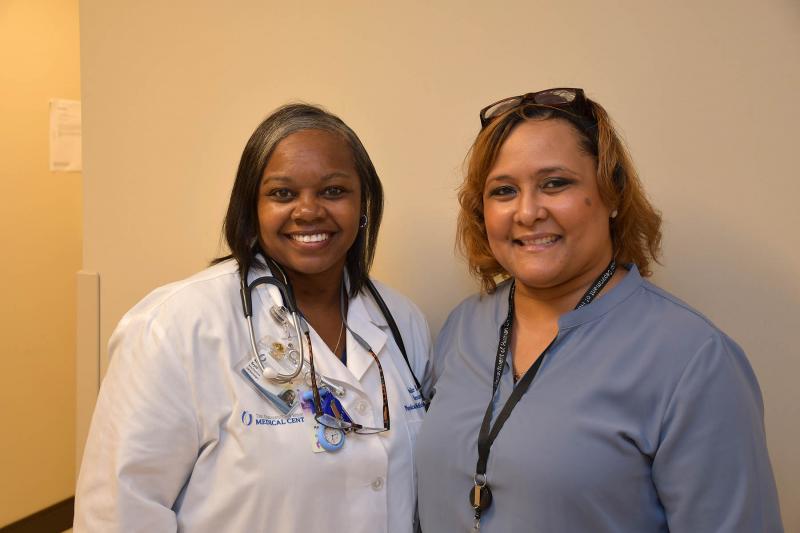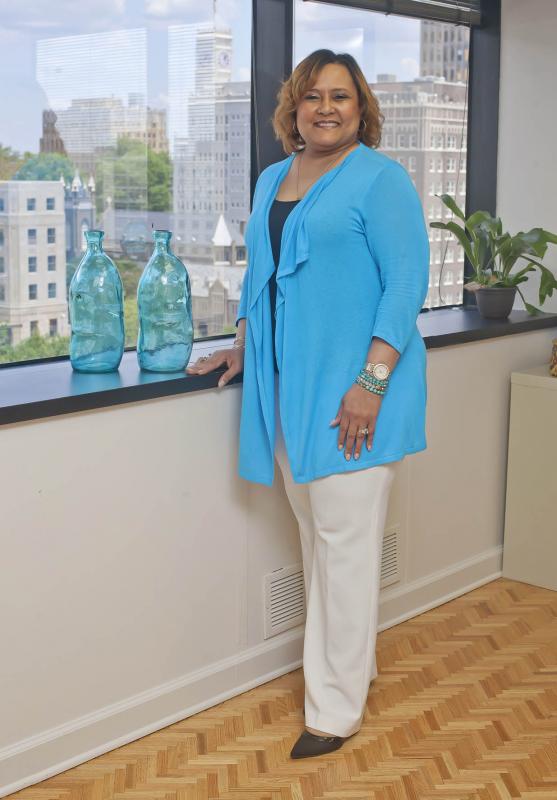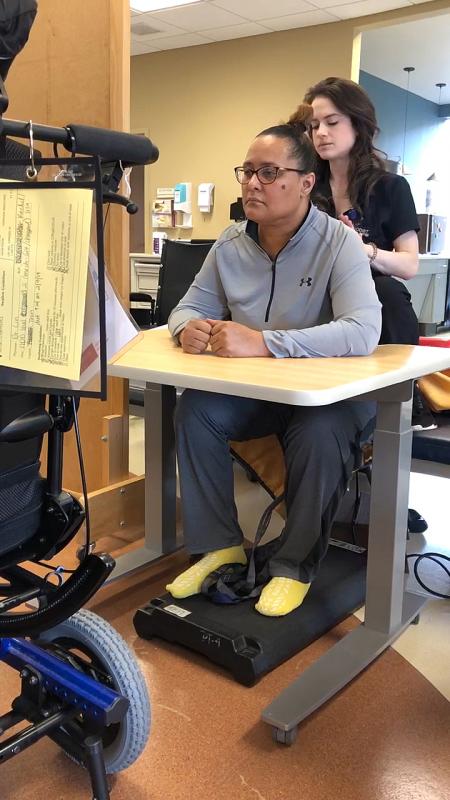Diagnosed with a paralyzing disease she’d never heard of, Dana Kidd’s first instinct was to google the name—Guillain-Barre’ Syndrome.
Only she couldn’t grasp her phone or even tap the touchscreen.
“I had no strength,” said the 48-year-old Meridian resident. “I could only listen to what everybody told me.”
And the news wasn’t good. Doctors said the neurological disorder might leave Kidd unable to walk for nine months or more.
Since she couldn’t even raise her eyebrows, Kidd had no reason to doubt their diagnosis. Dianna Brantley, on the other hand, thought doctors were underestimating her identical twin.
“I said: ‘They do not know Dana,’” said Brantley, also of Meridian. “Once she started therapy, I knew it was going to be a wrap. That’s what she does, she pushes through things.”
Sure enough, Kidd defied the dire prognosis. Less than four months after contracting GBS, she reclaimed her post as deputy administrator for the Mississippi Department of Human Services in Jackson.
A return to work had been Kidd’s primary goal during weeks of therapy at Methodist Rehabilitation Center in Jackson. So when she dropped by the hospital on her first day back at MDHS, it was a gratifying moment for staff.
“I almost didn’t recognize her,” said Natalie Keyes, an MRC nurse practitioner who helped guide her care. “I looked again and she said, ‘Yep, it’s me.’ It was beyond anything to see such a big difference.”
As Mississippi’s only hospital that specializes in rehabilitation medicine, MRC attracts GBS patients from across the state.
“We’ve seen four or five patients with GBS or variants of GBS in the past few months,” said neurologist Art Leis, a senior scientist at the Jackson hospital’s Center for Neuroscience and Neurological Recovery,
And that experience was a comfort to Kidd, who said MRC was always her first choice for therapy. “A friend had already told me about how wonderful they were,” she said.
Kidd arrived at MRC on Feb. 11, still reeling from a downward spiral that began the weekend of Martin Luther King’s birthday in January.
Normally busy during the holiday, Kidd said an unrelenting fatigue kept her homebound. “All I did was lay around, which was very unusual for me.”
On Jan. 22, Kidd still felt ill and had second thoughts as she headed to the airport to fly to a Washington D.C. conference. “When I got on the highway, I got to thinking: ‘What if I get to D.C. and I get worse and I’m not able to get home?’ “
She turned around and it turned out to be “the best decision I ever made.” Kidd’s hands and feet were going numb, she could barely walk and she was slurring her words. By Jan. 25, Kidd was totally paralyzed.
GBS occurs when the body’s immune system attacks and destroys myelin, the insulation that surrounds and protects nerve fibers, Dr. Leis explained. This causes a “short-circuit” that stops the nerves from conveying messages from the brain to the muscles. Over several days, a symmetrical paralysis usually starts in the legs and ascends up the body, paralyzing arm muscles and muscles that control swallowing and facial expression.
Dr. Leis said most patients also complain of loss of sensation and numbness. As the syndrome progresses, the immune attack can involve the phrenic nerves to the diaphragm that control breathing and the autonomic nerves that regulate blood pressure and heart rate and rhythm. In the most critical cases, victims become totally paralyzed and must rely on ventilators to breathe.
About half of GBS cases are triggered by some type of viral or bacterial infection. “Typically it’s an upper respiratory or gastrointestinal infection,” Dr. Leis said. “About 30 percent of GBS cases have been linked to Campylobacter jejuni, a bacteria found in undercooked foods such as poultry and a common cause of food poisoning in the United States.”
Other risk factors associated with GBS include vaccinations, stress and surgery. People who have compromised immune systems because of conditions such as HIV and those infected with mosquito transmitted diseases such as Zika, dengue or West Nile virus also may be more susceptible to the syndrome.
Kidd believes her case was likely linked to an infection or her recent sinus surgery. “I had been sick all of last year,” she said. “I had sinus problems, pneumonia three times and the flu. I couldn’t seem to get well. That’s why I had sinus surgery on Jan. 3.”
“I cried every day”
GBS is often misdiagnosed, and it took Kidd three ER visits and a switch to a second hospital before she learned the source of her suffering.
At Rush Hospital in Meridian, Laura Segrest, a family nurse practitioner with the neurology department, took one look at Kidd and felt a sense of déjà vu. In 2009, she also had been paralyzed by GBS.
“I saw her and thought: ‘Oh my gosh, she’s got Guillain-Barre’.’ The majority of our symptoms were the same and it was like I was looking at myself. I felt so overwhelmed because I could see in her the pain and suffering I went through.”
Segrest told Kidd: “You’ll get better, I promise.” And Kidd said she won’t ever forget Segrest’s impact that day.
“Every time I think about her, I cry. If it had not been for her, I believe I would have been in worse shape. When I got to the University of Alabama Medical Center in Birmingham (UAB), they said if I had gotten there 24 hours later I would have been on a ventilator and put in a coma.”
After a spinal tap supported the GBS diagnosis, Rush staff transferred Kidd to UAB, the first nearby hospital with an open bed for a neurology patient.
There, Kidd received five days of intravenous immunoglobulin (IVIG). Dr. Leis said the treatment is made of donated blood that contains healthy antibodies and is used to control a multitude of autoimmune disorders.
“By Day 3, I was able to raise my elbows up and move my feet,” Kidd said. “By the fifth day, I was able to move my arms more and lift my feet off the bed.”
Finally it was time to work on walking again, and Kidd was feeling a mix of anticipation and anxiety as an ambulance ferried her to MRC. Feeling helpless was a hard reality for someone who took pride in her independence.
“I cried every day at UAB and it got worse as I started going to therapy,” she said. “It was from excruciating pain and thoughts of not being able to do what I used to accomplish and disappointment that I couldn’t do what the therapists asked me to do.”
“The 48 years we’ve been on earth I’ve never seen her like that,” Brantley said. “Dana has never been a crier. She always charged through.”
“Initially, she was pessimistic because of the intensity of the pain,” Keyes said. But once her care team found the right medication mix to offer relief, Kidd was able to put more into her therapy sessions.
Can’t you see how far you’ve come?
With GBS patients, it’s important that they not overdo. So Kidd’s occupational and physical therapists worked together to limit her fatigue, while also keeping her motivated.
“A lot of times, patients come in and get disheartened. And you have to say: ‘Can’t you see how far you’ve come?’” said Methodist Rehab occupational therapist Anna Leigh Whitney.
Whitney said Kidd’s initial treatment focused on improving her endurance and strength. “She could not even raise her arms from her lap when we first started.”
And those limitations clearly impacted her mood. “At first, she was very emotional and very anxious,” Whitney said.
“I was crying every day and one day I happened to look around the room,” Kidd said. “I was the youngest in the room, and I saw older people who had one arm or leg and nobody was crying. That was the day I stopped crying and started working harder.”
“Once she saw she could do things, a light clicked on,” Whitney said. “She got motivated and progressed really well.
“As time went on, she would look at me and smile and say: ‘I bet you didn’t know I could do that, did you?’ I’d say, ‘I’m not impressed. I knew you could.’”
In physical therapy, Kidd moved from standing with the support of a tilt table to taking her first steps aided by an overhead lift system.
“We took each part of the process step by step and stayed focused on her progress and her long-term goal to return home with her husband and eventually return to work,” said MRC physical therapist Kathleen Dobbs. “Right before discharge, she was able to walk several feet with a rolling walker and assistance.”
Kidd says she “can’t say enough” about her therapists. “They pushed me, but they weren’t mean or aggressive. If Kathleen had extra time she’d come get me and work with me.”
To ensure Kidd went home as independent as possible, Whitney found ways to work around her limitations—like special tools to help her hold eating utensils. “When I was able to feed myself, that was a big moment for me,” Kidd said. “It’s amazing such a little thing helped so much.”
The therapists said another secret to Kidd’s success was her support system. “The family was here all the time, which was wonderful,” Whitney said.
“I couldn’t have done it without them,” Kidd said of her sister, Brantley; her husband, Alvin; and her parents, Sandra and Billy Joe Brantley. “I didn’t stay one night in the hospital by myself.”
Kidd said it was the support of her family that kept her encouraged and she does not know what she would have done without them. Kidd also had the support of her work family as they called, sent flowers, texted and visited her while in MCR. The MDHS Executive Director, John Davis and the Deputy Executive Director of Programs, Jacob Black, called and texted throughout her illness to make sure she was doing okay and to assure her that her job was waiting on her.
Kidd said she also benefitted from the nurturing nature of MRC’s staff. “If it was not for them, I wouldn’t be where I am today,’ she said.
She especially bonded with MRC’s rehab techs, who provide much of the hospital’s hands-on services.
“They made you feel like they really cared about you,” Kidd said. “I felt so good there, I didn’t want to leave. The day I left, four or five rehab techs came to my room and hugged me. They told me: ‘You’re going to be walking soon.’”
Kidd left MRC in a wheelchair on Wednesday, March 6, and through self-determination she was using a walker to get around by March 9. A week and a half later, Kidd said she astonished her sister by moving about without a walker or cane.
“She just lost it,” Kidd said. “She said: ‘You’re walking by yourself.’”
Kidd admits her pace still isn’t as fast as it used to be. And when she feels fatigued, she willingly relies on her power wheelchair.
“I can tell I’m still weak,” she said. But not so weak she wasn’t ready to return to work on April 15. “They said I probably wasn’t going back to work for three or four months, and I said there’s nothing wrong with my mind,” Kidd said.
Kidd said she wanted to reclaim her career because she loves her job. But she imagines her life will be more balanced going forward. Kidd is still going through outpatient physical therapy to help strengthen her legs and improve her balance.
“At the hospital, they asked me what my hobbies were. And my husband said: ‘Work, work, work.’ When I got GBS, I had four conferences I was scheduled to attend within a two month period which required me to cancel my reservation. I think it was God’s way of telling me I need to slow down. It has definitely made me appreciate things I haven’t appreciated before.”



